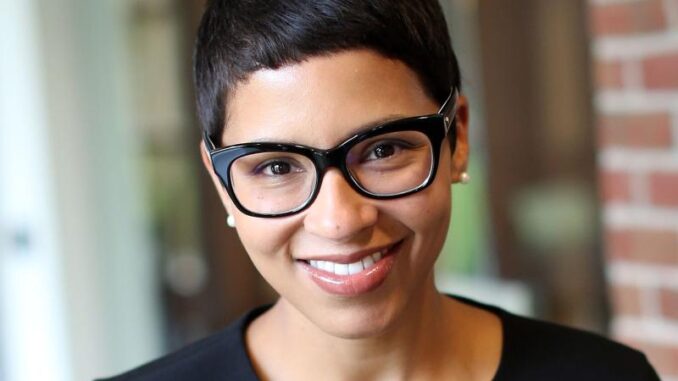
By Serena Edwards
Lawyer and professor Melissa Murray will be the upcoming Hess Scholar-in-Residence for the academic year 2024-2025. The Scholar-in-Residence program boasts annual scholars across disciplines and invites them for a week-long series of lectures and panels at BC. This year, the Wolfe Institute’s annual Hess Week is from April 1 to April 4, with lectures centered around the media, women’s reproductive rights, and democracy. The Vanguard sat down with Murray two weeks prior to Hess Week to discuss her background and beginnings, upcoming Hess Week topics, and advice she has for students pursuing a similar career path.
Murray is a law professor at New York University (NYU) and has been teaching there for 17 years. She is also a co-host for the podcast “Strict Scrutiny,” alongside co-hosts Kate Shaw and Leah Litman that discuss the Supreme Court rulings and the stigma around it. Murray also appears on MSNBC to provide insight as a legal analyst.
Murray was born in New York and moved to Florida when she was five. Her mother and grandmother never truly received the same opportunities that she had.
“My family, especially my grandmother and my mother. My grandmother was born and raised and lived her entire life in Jamaica, and she never really had a formal education,” stated Murray.
Murray dove deeper into the past of gender stereotypes, especially those pushed onto women.
“I think she sort of tapped out a formal education in grade school, and you know she grew up at a time where it wasn’t seen as necessary to educate girls because they would just go on to be housewives,” she stated. “I recall being very young, like 6 or so, and realizing that I probably knew how to read better than she did. But she was a remarkable person who is incredibly smart.”
Murray touched upon the difficulties she faced getting to where she is today.
“I’m in a career, being a law professor where there aren’t a lot of Black women, certainly not full professors, tenured professors, and certainly not at the top 10 law schools,” stated Murray. She discussed the difficulty of not having the representation, but also not letting that be an obstacle.
“The lack of role models, I think, was difficult. But I just want to emphasize it wasn’t insurmountable,” expressed Murray. She emphasized that mentorship is based on shared interests rather than similar appearances.
“One of the things that really was important for me is that if I wanted mentorship, I recognized immediately that I would have to look beyond individuals who shared certain characteristics of mine that I would actually have to look to foster relationships based on shared interests,” said Murray.
To get where she is today, Murray discussed the different routes that she took.
“I went to law school, thinking that I would be a civil rights lawyer in the mold of a Thurgood Marshall or Constance Baker Motley.” Murray mentioned that before fully diving into the depths of law she was pursuing business, but always knew law was the route she would choose.
“After graduating from college, I worked for two years as a management consultant, and there was a period where I thought, maybe I’ll go to business school, but I didn’t really love it enough, and I always knew, like I had applied to law school before taking this job, and so I had this sort of sell by date,” stated Murray.
Murray also worked for the National Association for the Advancement of Colored People (NAACP) during her first year of law school. She reflected on how she felt unprepared at that time and didn’t fully embrace the experience.
“I probably was not in the best position to fully appreciate how important the work I was doing really was, because, you know, I was a first year student. I wasn’t terrible,” explained Murray. Following that, Murray worked at another law firm that made her question her career path.
“I just kind of left those 2 experiences wondering, maybe I made the wrong choice. Maybe being a lawyer, a civil rights lawyer wasn’t what I wanted to do. I definitely didn’t want to work at a law firm,” expressed Murray.
She realized she wanted to do law, but also wanted it to have meaning.
“You know, I was thinking about what I could do with this law degree that would be satisfying and would be meaningful,” stated Murray.
She then spoke about how she realized how flexible being a professor could be.
“It occurred to me that my law professors seemed to have the best of all worlds. They worked on really important cutting edge issues,” Murray told The Vanguard. “They got to teach and be engaging with these young people all of the time. They had a really great life. I thought, maybe I should think about that. And that’s effectively how I began investigating and ultimately becoming a law professor.”
When discussing Hess Week, Murray talked about the events that will take place and how they all tie into each other.
“I think they all kind of relate to one another, so I’m not especially wedded to any of them. I think they all work really nicely together,” stated Murray
Murray expressed what she hopes the audience will take away from Hess Week.
“I hope they’ll walk away with a sense of how all these different things fit together. Maybe they’ll learn something that they didn’t know all of those things,” she told The Vanguard. “I’m just hopeful that it’s a week where the audience is as excited about it as I am.”
